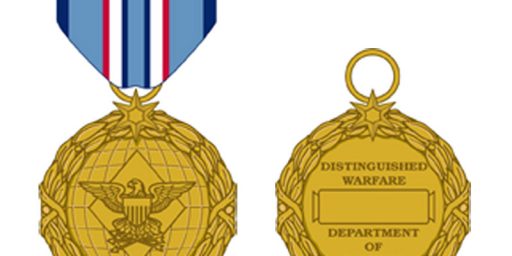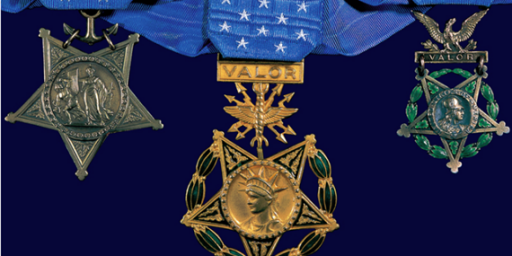Stolen Valor Act of 2012
Outgoing Senator Jim Webb is making another attempt at passing the Stolen Valor Act, deemed unconstitutional last year by the US Supreme Court.
Outgoing Senator Jim Webb is making another attempt at passing the Stolen Valor Act, deemed unconstitutional last year by the US Supreme Court.
An amendment to the defense appropriations budget passed on November 28, Webb, along with co-sponsors Scott Brown and Joe Lieberman (none of whom will be back in the next Congress, unless Brown wins an election for an open seat in the case John Kerry is appointed to the Cabinet), attempt to get around the SCOTUS finding that lying about military valor is protected free speech by arguing that it’s essentially fraud, which the majority in Alvarez concedes is not protected.
The “Findings” section of the Stolen Valor Act of 2012 tries to set up this argument:
Congress find [sic] the following:
(1) Because of the great respect in which military service and military awards are rightfully held by the public, false claims of receiving such medals or serving in the military are especially likely to be harmful and material to employers, voters in deciding to whom paid elective positions should be entrusted, and in the award of contracts.
(2) Military service and military awards are held in such great respect that public and private decisions are correctly influenced by claims of heroism.
(3) False claims of military service or military heroism are an especially noxious means of obtaining something of value because they are particularly likely to cause tangible harm to victims of fraud.
(4) False claims of military service or the receipt of military awards, if believed, are especially likely to dispose people favorably toward the speaker.
(5) False claims of military service or the receipt of military awards are particularly likely to be material and cause people to part with money or property. Even if such claims are unsuccessful in bringing about
this result, they still constitute attempted fraud.(6) False claims of military service or the receipt of military awards that are made to secure appointment to the board of an organization are likely to cause harm to such organization through their obtaining the services of an individual who does not bring to that organization what he or she claims, and whose falsehood, if discovered, would cause the organization’s donors concern that the organization’s board might not manage money honestly.
(7) The easily verifiable nature of false claims regarding military service or the receipt of military awards, the relative infrequency of such claims, and the fact that false claims of having served in the military or received such awards are rightfully condemned across the political spectrum, it is especially likely that any law prohibiting such false claims would not be enforced selectively.
(8) Congress may make criminal the false claim of military service or the receipt of military awards based on its powers under article I, section 8, clause 2 of the Constitution of the United States, to raise and support armies, and article I, section 8, clause 18 of the Constitution of the United States, to enact necessary and proper measures to carry into execution that power
This all strikes me as rather laughable. That is, the harms being cited are so tiny and theoretical that it’s absurd to fashion criminal laws to prevent their occurrence.
Furthermore, as section (7) rightly points out, it’s absurdly easy to find out whether someone’s claims regarding military service are real. So, if they’re somehow determinative of a decision to offer employment, a position on a governing board, or the like, isn’t the onus on the offerer to verify–just as it is with any other claim someone might make on a resume?
Indeed, there’s plenty of data showing that having a college degree, much less a graduate degree, on one’s resume leads to better jobs and higher salaries. Because of that–and the fact that much of the value is the credential itself–a not inconsiderable number of people lie on their resumes claiming to have degrees they either never finished or never even started. Arguably, that’s a more material fraud than claiming to have served in a combat zone or been wounded in the line of duty–neither of which is likely to have any bearing whatsoever on one’s qualifications for a job. Yet, I’m pretty sure lying about one’s educational achievements, while a fireable offense, is not criminal.
I’ve said it many times since this controversy crept up several years back: Lying about military heroism is a sign of weak character. Those who do it should be appropriately shunned and ridiculed. They should not, however, go to jail.
via Ryan Caldwell






I’m part of the faction that thinks that lying is presumptively non-protected speech. There is no societal benefit from protecting outright falsehoods.
@Geek, Esq.:
I’m part of the faction that thinks that lying is presumptively non-protected speech.
That’s a frightening authoritarian position you have. Since you don’t think the 1st Amendment applies to lying (an absurd position, generally speaking), do you think it should be a crime?
@mantis:
Lying very frequently is a crime. False statements of all kinds of criminally sanctioned–lying to a court, law enforcement, lying about financial information, safety risks, etc.
The question is when does punishing a lie do more harm than good, when would it pose a risk to legitimate speech, etc. Certainly every day lies about personal matters shouldn’t be punished, ditto for claims made in political campaigns.
A narrowly targeted category about statutorily specified medals of honor seems to be limited to avoid the perils normally associated with punishing speech acts.
Even putting aside the obvious-as-daytime 1st Amendment problems, this arguably is the most unnecessary and downright frivolous piece of federal legislation of our generation. We need the federal government to protect employers from hypothetical resume fraud?? Give me a f’n break.
@Geek, Esq.:
Lying very frequently is a crime.
Generally speaking, it is not.
The question is when does punishing a lie do more harm than good, when would it pose a risk to legitimate speech, etc.
Indeed, that is the question.
A narrowly targeted category about statutorily specified medals of honor seems to be limited to avoid the perils normally associated with punishing speech acts.
It does, but that’s not what I was asking about. You said lying shouldn’t be protected by the 1st Amendment. Where’s the line where lying becomes a crime? Is it only regarding law enforcement, libel/slander, negligence, and military medals? If lying were not protected speech, what would stop lawmakers from making all kinds of lying crimes? For instance, what if a state legislature made lying on a resume a crime? How about if I tell a cop I wasn’t speeding if he pulls me over. If the court finds that I was speeding, should I also be charged with criminal lying? What if I say something that isn’t true but you don’t know if I knew it wasn’t true? How many people would be falsely convicted for believing incorrect information? How many more “narrowly targeted” crimes will we create before it goes too far?
The 1st Amendment exists for a reason. You can’t just exclude huge parts of speech that nearly everyone engages in just because you don’t like that kind of speech. You would open things up for some pretty nasty thought-police style government. No thanks.
@mantis:
Lying becomes subject to legal sanction (civil or criminal) when it causes a legally recognizable harm. Fraud is a crime. Perjury is a crime. Misleading investigators is a crime.
Libel and slander can get you sued and assessed a monetary judgment.
The standard for lying is generally “if you say something that you know is false.”
Are you suggesting that fraud shouldn’t be a crime?
@Geek, Esq.:
Fraud is already a crime. If lying about military medals really does amount to fraud, why not charge them with fraud? Why do we need to create a new crime here?
The reason why is because the harms being suffered here in reality are de minimis, and would get laughed out of court if it were charged as fraud.
The punishment of convicting someone of a federal felony is so insanely out of proportion with the actual harms suffered, that it borders on sadistic.
Jim Webb overall has been a huge disappointment in the Senate.
@Ben:
Because the harm doesn’t flow from inducing people to part with money, but rather it degrades and cheapens the entire enterprise of awarding medals for valor in the first place.
I can see the case for ruling against such legislation, but it’s not as clear as some claim it is.
Honestly, if it were a crime to not lie about receiving war medals and people feared to do so, what would the loss to society be?
@Geek, Esq.:
If the harm is “degrading and cheapening the enterprise of awarding medals”, then that is no harm at all (at least not one that is legally recognised) and any comparison with fraud is ridiculous.
The loss to society is throwing people into jail for telling falsehoods that do no direct monetary or legal injury to anyone else.
@Geek, Esq.:
Lying becomes subject to legal sanction (civil or criminal) when it causes a legally recognizable harm.
But you argue that it should not be protected speech in any circumstance, which would lower the threshold for classifying lying to a crime to anything a legislature imagines. Do you think that is a good idea?
Libel and slander can get you sued and assessed a monetary judgment.
But those are civil judgements, not criminal. Do you want to make them crimes?
The standard for lying is generally “if you say something that you know is false.”
Proving what someone does or does not know is quite difficult. How many people should be locked in jail because a jury decided they knew something was false with no evidence?
Are you suggesting that fraud shouldn’t be a crime?
Not at all, but agreeing that fraud should be criminal and deciding that the 1st Amendment should not apply to any untrue statements are two very different things.
Because the harm doesn’t flow from inducing people to part with money, but rather it degrades and cheapens the entire enterprise of awarding medals for valor in the first place.
So if I say I have a college degree but I don’t, doesn’t that degrade and cheapen the entire academic system of awarding degrees? If I tell people I scored five touchdowns in a high school football game but I didn’t, doesn’t that degrade and cheapen the entire idea of competitive sports?
Maybe those things do degrade and cheapen those institutions, but that doesn’t mean it should be a crime. Lots of stuff gets degraded and cheapened by people’s actions. Why should those actions be criminal? What is sacred and what isn’t? Who decides?
Honestly, if it were a crime to not lie about receiving war medals and people feared to do so, what would the loss to society be?
A more authoritarian and less free society.
Some may remember in the early 2000s Bill O’Reilly repeatedly claimed that his former show, Inside Edition, won a Peabody Award. in 2003 Al Franken pointed out that the show had never won the award. O’Reilly’s response was that he misspoke or forgot which award the show had won, which was actually a Polk Award.
How would you prove that O’Reilly lied and wasn’t just mistaken or confused? If a jury were to decide that he lied, should Bill O’Reilly go to jail for speaking this falsehood?
@Geek, Esq.:
What degrades the enterprise is laws like this.
So now you want people to go to jail for telling the truth? 😉 (could not resist)
@Geek, Esq.:
Well….so? That harm, nebolous as it is, hardly seems to outweigh the damage to society done by criminalizing harmless puffery.
@mantis:
Paul Ryan claimed he ran a sub 3:00 marathon — didn’t that degrade and cheapen the entire athletic system in this country? Shouldn’t he have faced criminal sanctions for that….?
The only thing being cheapened here is the 1st Amendment.
As someone who has a couple of medals on his wall (nothing approaching the CMoH, just service medals mostly) and someone who has dealt with people who have lied about either being deployed to some hot spot, doing some dangerous job or just being really important I’ve got one thing to say: this law is dumb. Liars either tell a whopper so big that they are usually easy to spot (“You flew F-14’s in the Air Force? Really?“) or they’re so innocuous that they don’t matter.
Tell me what is the punishment for impersonating a police officer or fireman? Anyone. It’s a felony, this false hood you speak, is in turn the same. You are impersonating a troop, so in turn why is it illegal to do so with other public servants and not the military?